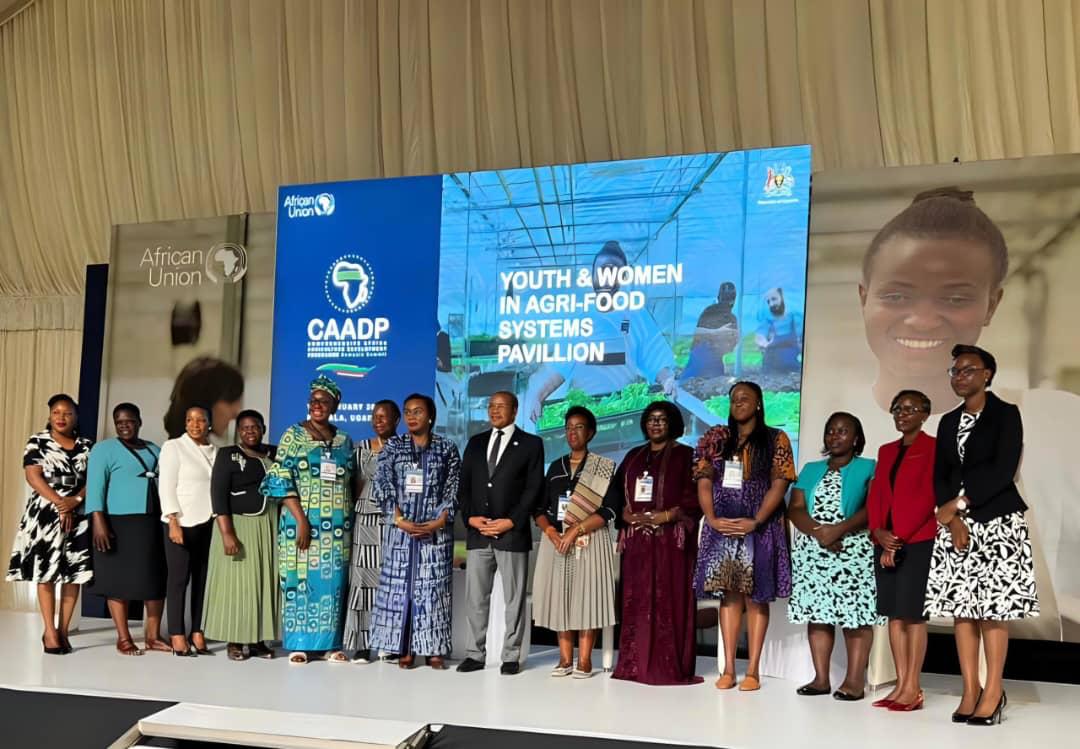By Amanya Julian
The Food Rights Alliance (FRA), Action Against Hunger, and other Women-led Organizations call for a movement where women and girls take the lead in combating hunger and malnutrition to achieve the milestones set by the Comprehensive Africa Agriculture Development Programme (CAADP).
This was emphasized during a side event session at the CAADP Kampala Summit, titled “Gender Justice to Enhance the Resilience of Women Leading Against Hunger and Malnutrition.” Key stakeholders highlighted the critical role women play in Agrifood transformation, focusing on addressing structural imbalances that hinder women’s participation in leadership across agrifood systems. The session explored how women’s leadership is essential in strengthening Agri-food systems and identified opportunities to enhance their resilience in the fight against hunger and malnutrition.
FRA has been working closely with partners to develop strategies that enhance women’s leadership in the Agrifood system.
A Turning Point for CAADP
The Extraordinary Summit held in Kampala in January 2025 marked a significant turning point in CAADP’s history. For the first time, the program has taken a deliberate approach to addressing critical issues affecting women in agriculture. This shift reflects CAADP’s commitment to inclusivity and equitable livelihoods, recognizing women’s vital role in African agriculture and the systemic barriers that hinder their progress.
Key Stakeholders and Discussions
Distinguished speakers at the session included H.E. Rhoda Peace Tumusiime, former Commissioner for Rural Economy and Agriculture at the African Union Commission; Dr. Ruth Aisha Kasolo, GROW Project Coordinator at the Private Sector Foundation Uganda (PSFU); and Ms. Lovin Kobusingye, President of the Women Fish Processors and Exporters Association. The session was also graced by H.E. Jakaya Kikwete, former President of Tanzania.
In her opening remarks, Ms. Agnes Kirabo, Executive Director of FRA, emphasized the importance of moving beyond rhetoric to practical action in decision-making.
“It is public knowledge that women provide over 70% of the labor in the agrifood system. However, they face significant challenges in accessing production resources, earn low wages, and have limited access to lucrative markets. Women in agrifood systems are not seeking sympathy but solutions. They demand equity and justice to receive their fair share of entitlements.”
Ms. Kirabo called for economic, psychological, emotional, technological, political, and social empowerment of women and girls, recognizing their leadership as essential for inclusive agrifood systems.
H.E. Rhoda Peace Tumusiime commended FRA and its partners for promoting gender and social justice in the agricultural sector.
“I would like to thank the Food Rights Alliance and partners for advancing gender and social justice in the agriculture sector and ensuring that discussions like these remain alive and high on the agenda for African countries.”
She emphasized the significant imbalance between women’s contributions to agrifood systems and their decision-making power. She urged African countries to adopt and enforce legal frameworks that promote gender parity in the sector.
Dr. Ruth Aisha Buyinzika Kasolo, GROW Project Coordinator at PSFU, shared insights on the GROW Project, an innovative financing scheme for women in agrifood systems. She highlighted the increasing demand among women for financing beyond microloans, as many are scaling up their businesses and require more capital.
“Across 125 branches of five participating banks, over 1,843 women accessed loans within three months, demonstrating the high demand. However, collateral requirements remain a major barrier, as many women must rely on their husbands for financial support.”
She called for guarantee schemes to help women secure loans without collateral, particularly in agriculture and value-addition sectors. Additionally, she emphasized the need for women-led businesses to formalize their operations, which would enhance their access to financing and investment opportunities.
The discussions also highlighted the proactive efforts of women in transforming agrifood systems.
“Women have formed groups and cooperatives to advocate for fairness and pool resources for their agribusinesses. Transparent access to resources and investment opportunities, especially in trade, must be prioritized to empower women entrepreneurs,” said Lovin Kobusingye.
There was a strong call for stakeholders to actively engage with the new CAADP strategy and action plan, which will guide interventions over the next decade. Prioritizing the social and economic inclusion of women is essential to addressing poverty, hunger, and malnutrition in Africa.
The Path Forward
The discussions underscored the urgency of empowering women and girls to lead Africa’s agrifood transformation. Given their substantial contribution of labor to the sector, financial and economic empowerment is crucial for advancing Africa’s food systems. However, if systemic barriers persist, realizing this vision will remain a challenge.
The Food Rights Alliance remains committed to promoting inclusivity and strengthening women’s resilience within agrifood systems through initiatives like the RECOP program. By providing women with the necessary resources and opportunities, FRA continues to champion women’s empowerment, enabling them to spearhead the fight against hunger and malnutrition.
Achieving a resilient agrifood system in Africa is only possible if the majority of actors—women—are made more resilient to the challenges of exclusion. Strengthening their leadership and ensuring equitable access to resources will be key to transforming agrifood systems and securing Africa’s food future.
